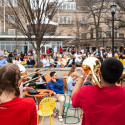After 40 years, staff secretary retires
Stephen A. Myrah knows the steps of Bascom Hall quite well.
“I’ve been trotting up and down those stairs since 1956 as an undergraduate,” he says.
After more than four decades on campus, Myrah is making those trips less frequently now. He retired Thursday, July 1, as secretary of the academic staff, although he is still working 10 hours a week writing a history of the academic staff and archiving documents from the past 25 years. Colleen McCabe has taken the secretary’s position.
Myrah arrived on campus as an 18-year-old history major from Milwaukee, with plans to be a history professor. At the time, he was one of 16,099 students (now there are more than 40,000), and tuition cost a whopping $180 per year for resident undergraduates (it will be $3,290 this fall).
He completed his bachelor’s degree, cruised through a master’s degree in American history and then signed on for a two-year hitch in the U.S. Army – which turned out to be his only hiatus from UW–Madison in 43 years.
“I never planned any of this,” says the 61-year-old Myrah.
Following his military stint, Myrah returned to Madison, began working part-time in the university’s financial aid office and enrolled in Ph.D. program in higher education administration. The part-time job turned into a full-time position, and Myrah became a part-time student. Myrahworked his way up to assistant director of student financial services while completing his doctorate.
He took over the secretary of the academic staff position in 1992, only the second person to occupy the post after Robert Miller. The position was created in 1987 after academic staff members were granted a formal role in helping administer the university, which is known in academic parlance as shared governance.
The secretary of the academic staff coordinates the activities of the Academic Staff Assembly and its executive arm, the Academic Staff Executive Committee, and oversees academic staff elections.
“To me, it was a dream job,” Myrah says.
That’s because Myrah helped found the Madison Academic Staff Association and was long interested in issues involving academic staff at the university. He served on ASEC for 3 1/2 years and was its chair in 1991-92.
Several key initiatives related to academic staff governance were implemented during Myrah’s tenure as secretary:
* Academic staff members now serve on all shared governance committees.
* ASEC meets regularly with the University Committee, the Faculty Senate’s executive arm, to discuss issues of mutual interest.
* Academic staff can now be granted permanent principal investigator status for grant-funded research.
* Academic staff serve on the University Academic Planning Council and similar councils in all schools and colleges.
* Committees on Academic Staff Issues have been established in each school and college and non-academic units on campus.
There are 5,567 academic staff members at UW–Madison, ranging from clinical professors and instructors to student services personnel, outreachemployees and researchers. They are the largest block of employees on campus.
“Things at the campus administration level work very smoothly for academic staff in shared governance,” Myrah says. “The challenge now is for shared governance to work more smoothly at the school, college and department level. That’s our next big frontier.”
Myrah is politically active as well. He is a member of the Academic Staff Public Representation Organization, the lobbying group for UW System academic staff, and was ASPRO’s president in 1989-90. He is an active supporter of university and academic staff issues at the Legislature, and regularly writes legislative testimony and letters to the editor.
“When I was here in the ‘50s and early ‘60s, the university was the darling of the Legislature,” Myrah says. “That changed during the Vietnam War with the student riots. I still think the university is paying for that. Now we have to scrap for every cent we get from the state.”



